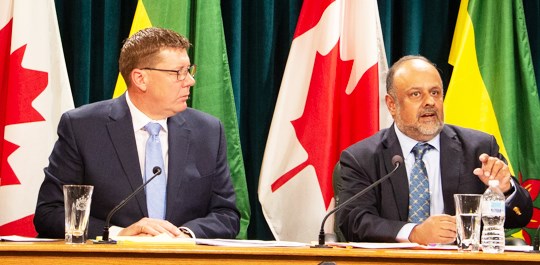The date for the next phase of the Re-Open Saskatchewan plan is Monday, June 22, announced by Premier Scott Moe and Chief Medical Health Officer Dr. Saqib Shahab on Tuesday afternoon.
On that day, activities scheduled for the first part of Phase 4 of the plan to re-open the province can get underway, including:
• child and youth day camps;
• outdoor pools and splash pads; and
• outdoor sports and activities.
Residents are advised to check with the local operator of the activities noted above regarding availability. Some municipalities have indicated that activities, such as outdoor pools, may remain closed.
A date for the second part of Phase 4 will be announced at a later time and will include indoor pools, rinks, libraries, museums, galleries, movie theatres, casinos and bingo halls.
Gathering Sizes
Effective Monday, June 22, indoor gatherings of up to 30 are only permitted where space allows for two metres of physical distancing between participants.
For food service at indoor gatherings, potlucks are discouraged and there should be no shared platters of food or shared buffet service. If food is being served, it should be plated. One person should handle the preparation of food and drink following proper food safety protocols. This reduces the number of people who touch serving utensils or drink containers.
Meantime, there is one new case of COVID-19 in Saskatchewan to report as of June 16, bringing the provincial total to 684. The new case is in the Saskatoon region.
Of the 684 reported COVID-19 cases in Saskatchewan, 40 are considered active. A total of 631 individuals have recovered.
Two people are receiving inpatient care, one in the North and one in Saskatoon. One person is in intensive care in Saskatoon.
Of the 684 cases in the province, 146 cases are travellers; 409 are community contacts (including mass gatherings); 81 have no known exposures; 48 are under investigation by local public health, and 52 cases are health care workers; however, the source of the infections may not be related to health care in all instances.
By region, 277 of the cases are from the Far North, 182 are from the Saskatoon area, 112 from the North, 80 from the Regina area, 19 from the �鶹��ýAV and 12 from the Central region.
Broken down by age category, 104 cases involve people 19 years of age and under; 241 cases are in the 20-39 age range; 207 are in the 40-59 age range; 114 are in the 60-79 age range; and 18 are in the 80-plus range.
About 51 per cent of the cases are females and 49 per cent are males. Thirteen deaths related to COVID-19 have been reported to date.
To date, 56,715 COVID‐19 tests have been performed in Saskatchewan. As of June 14, when other provincial and national numbers were available from the Public Health Agency of Canada, Saskatchewan’s per capita rate was 42,855 people tested per million population. The national rate was 58,088 people tested per million population.
Outdoor gatherings of up to 30 people continue to be permitted with a two-metre physical separation between individuals.
Physical distancing requirements still apply both to indoor and outdoor gatherings.
Gathering sizes should be smaller if there isn’t enough space to maintain a physical distance of two metres at all times.
Remember the Fundamentals to Prevent COVID-19 Transmission
With Phase 4 of the Re-Open Plan beginning June 22, it is critical for Saskatchewan residents to remember to take precautions to prevent the spread of COVID-19.
• Indoor and outdoor gatherings must follow physical distancing rules.
• Small, infrequent gatherings are better than large, frequent gatherings.
• Outdoor gatherings are better than indoor gatherings.
• Stay home if you are sick.
COVID-19 Testing
Testing for COVID-19 is available to anyone currently working outside the home or anyone returning to work as part of the Re-Open Saskatchewan plan.
Testing is also available to those being admitted to acute care for more than 24 hours, including expectant mothers, and immune-compromised individuals and their health care providers.
If you are experiencing symptoms of fever, cough, shortness of breath, headaches, aches and pains, sore throat, chills, runny nose or a loss of your sense of taste or smell, contact HealthLine 811 or your family physician for advice on whether you should be tested for COVID-19. You can also take the online self-assessment at .




